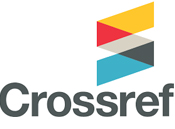The Use of Group Investigation Learning Strategy to Improve Mathematics Learning Outcomes in Vocational High School Students
Abstract
The learning outcomes of students in class XI of SMK Negeri 1 Bengkalis are unsatisfactory because the scores are below the completion level. This is due to the lack of varied learning strategies. This research aims to improve mathematics learning outcomes by applying group investigation strategies. The formulation of the problem in this study is whether the application of group investigation strategies can improve the learning outcomes of mathematics students in class XI SMK Negeri 1 Bengkalis. This classroom action research (PTK) was conducted in 1 cycle with five meetings. The subjects of this study were students of class XI SMK Negeri 1 Bengkalis, totalling 20 people. The results showed that learning by applying a group investigation strategy on Statistics material can improve students' mathematics learning outcomes in class XI SMK Negeri 1 Bengkalis. This is evident from the percentage of student learning completeness, which reached 79.5%.
References
Z. Arifin, Evaluasi Pembelajaran. Jakarta: Direktorat Jenderal Pendidikan Islam Kementerian Agama, 2012.
O. Hamalik, Kurikulum dan Pembelajaran. Jakarta: Bumi Aksara, 2011.
B. Jose, “Strategi Belajar Investigasi Kelompok untuk Meningkatkan Hasil Belajar Matematika di kelas II SMP Negeri 1 Tebing Tinggi,” Universitas Riau, 2006.
H. M. Siregar, Nurjanah, and R. Nuraenia, “Development and Integration of GeoGebra Applets in Mathematics Learning,” Pedago. J. Ilm. Pendidik., vol. 8, no. 1, pp. 33–46, 2024, doi: https://doi.org/10.55215/pedagonal.v8i1.9362.
M. Ali, Guru Dalam Proses Belajar Mengajar. Bandung: Sinar Baru, 1987.
L. A. Utami, F. S. Adikara, and E. Susiloningsih, “Differentiated Learning Group Investigation Model to Improve Mathematics Learning Outcomes in Elementary Schools,” EduStream J. Elem. Educ., vol. 8, no. 2, pp. 68–79, 2024, doi: 10.26740/eds.v8n2.p68-79.
Okta Rosfiani, Windu Syaeful Ridwan, H. Ardiyanti, Cika Auliya Nurrohmah, Fitrha Ramadhan, and Afandy Muharrom, “The Effectiveness of Collaborative Learning with Group Investigation in Mathematics Lessons in Elementary School Education in South Tangerang, Indonesia,” Enigm. Educ., vol. 2, no. 1, pp. 49–52, 2024, doi: 10.61996/edu.v2i1.52.
C. Y. Eviyanti, L. Rista, S. Hadijah, and A. Andriani, “The Implementation of Group Investigation Learning Model Through Domino Mathematics Media on the Rank Number and Root Form Materials,” Malikussaleh J. Math. Learn., vol. 4, no. 1, pp. 28–33, 2021, doi: 10.29103/mjml.v4i1.3118.
K. Aini, M. Mahsup, V. Mandailina, A. Abdillah, and P. A. Febriani, “The Effect of Group Investigation Model of Learning on Improving Mathematics Learning Outcomes,” Union J. Ilm. Pendidik. Mat., vol. 12, no. 2, pp. 402–412, 2024, doi: 10.30738/union.v12i2.17515.
F. Razak, “The Effect of Cooperative Learning on Mathematics Learning Outcomes Viewed from Students’ Learning Motivation,” JRAMathEdu (Journal Res. Adv. Math. Educ., vol. 1, no. 1, pp. 49–55, 2016, doi: 10.23917/jramathedu.v1i1.1785.
S. Fatimah, F. Nur, S. Suharti, S. Sulasteri, and A. D. Angriani, “Pemahaman Konsep Matematika Menggunakan Model Pembelajaran Problem Based Learning dan Group Investigation,” Delta J. Ilm. Pendidik. Mat., vol. 9, no. 2, pp. 191–200, 2021, doi: 10.31941/delta.v9i2.1319.
Zuhri, Irwan, Ismail, Hidayat, and R. Hasibuan, “Application of Group Type Learning Model Investigation of Capabilities Mathematical Communication,” Int. J. Soc. Serv. Res., vol. 3, no. 4, pp. 1052–1059, 2023, doi: 10.46799/ijssr.v3i4.356.
Y. S. Harahap and T. H. Harahap, “The Effect of Collaborative Learning Model on Mathematics Problem Solving Ability Tritech Informatika Vocational School Students Medan T.P 2021/2022,” EduMatika J. MIPA, vol. 2, no. 3, pp. 75–79, 2022, doi: 10.56495/emju.v2i3.244.
S. Nurjanah and W. Wikanengsih, “Model of Implementation of Investigation Group Learning in Improving the Ability to Write Negotiation Text in Vocational School,” JLER (Journal Lang. Educ. Res., vol. 3, no. 2, pp. 24–30, 2020, doi: 10.22460/jler.v3i2.p24-30.
N. Khasanah and H. A. Setiaji, “The Effectiveness of Cooperative Learning Model with Group Investigation (Gi) Using Comic Media Towards Mathematical Literacy Ability of Viii Students at SMP Negeri 1 Punggelan,” Int. J. Res. Math. Educ., vol. 1, no. 2, pp. 169–180, 2023, doi: 10.24090/ijrme.v1i2.9293.
A. Majid, Y. Hala, and Syamsiah, “Comparison Between Motivation And Learning Result by employing Cooperative Learning Model of Two Stay Two Stray Type (TSTS) and Group Investigation Type (GI) of Grade X Student at SMAN 2 Bulukumba,” Anterior J., vol. 23, no. 3, pp. 10–16, 2024, doi: https://doi.org/10.33084/anterior.v23i3.7197.
M. Makbul, Ferianto, N. Husain, N. A. Farida, and N. Munafiah, “The Influence of Investigation Group Type Cooperative Learning on the Critical Thinking Ability of Students of the Islamic Religious Education Program University of Singaperbangsa Karawang,” Concienc. J. Islam. Educ., vol. 24, no. 1, pp. 1–14, 2024, doi: https://doi.org/10.19109/0x3y7t45.
M. Ulfa, S. E. K. Dewi, and R. P. Pertiwi, “The Influence of the ‘Mading Pintar’ Group Investigation Learning Model on Primary School Student Learning Outcomes,” J. Elem. Educ. Res., vol. 4, no. 2, pp. 143–156, 2024, doi: https://doi.org/10.30984/jeer.v4i2.998.
Copyright (c) 2025 Journal of Research on Mathematics Instruction (JRMI)

This work is licensed under a Creative Commons Attribution-NonCommercial-ShareAlike 4.0 International License.






